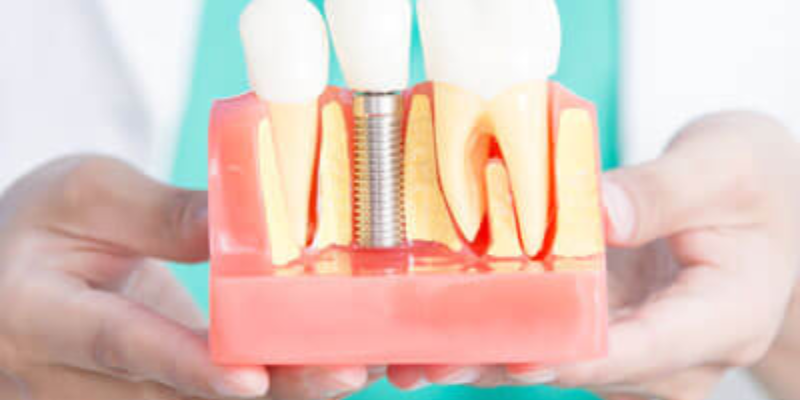Cost Of Dental Implants In California
Because it replaces the smile and function of natural teeth, a dental implant will allow you to smile brightly once more. It helps prevent jawbone damage by allowing the wearer to bite and chew foods normally. Let’s look at the price and value of this sort of dental restoration in comparison to other options.
According to The New York Times and the American Academy of Implant Dentistry, the cost of dental implants in California ranges from $3,000 to $4,500. The implant, abutment, and implant crown are all included in this price. This can be costly, but dental insurance may cover the cost of the implant crown.
Unfortunately, because dental implants are considered a cosmetic operation in most circumstances, not all insurance coverage will cover them. Treatments such as upper or lower jaw restoration and extraction to allow you to eat or speak properly may be covered. Check to see if your insurance company covers the cost of dental implants. Many dental insurance plans cover the expense, although there is normally a $1,500 annual reimbursement cap. This sum hasn’t changed in decades, while it may be sufficient to cover the cost of a single implant; you’ll be responsible for the remainder.
What Affects Cost Of Dental Implants In California?
Implants are more cost-competitive than implants and dentures, according to studies conducted by the American Academy of Implant Dentistry. Below are some of the variables to consider while choosing implants over alternative options. The jawbone can degenerate over time if you have missing teeth. If you don’t chew your food properly, you risk choking or suffering digestive problems, which is typically the case with missing teeth.
Fewer doctor visits, lower long-term replacement expenses, and no special instruments or maintenance required other than normal mouth hygiene. Dentures often make it difficult to drink, eat, or speak. Although dentures are less expensive at the beginning than implants, they must be replaced every 5 to 15 years.
Patients who cannot afford to pay for their treatment in full can take advantage of our affordable monthly payment plans. With our flexible payment plan, you’ll pay a lower portion of your overall charges monthly over a set period of time. A dental implant may appear to some as a luxury or even an unnecessary investment, especially when there are less expensive alternatives. Getting this treatment, on the other hand, is the closest thing to having natural teeth that work. This benefit alone makes it worthwhile to think about and plan for.
Does Insurance Cover The Cost Of Dental Implants In California?
The average dental insurance policy will cover up to $1,500 of the total cost of treatment. Verify what portion of the treatment is covered with your insurance company. They may be able to pay for some components of the treatment even if dental implant surgery is not reimbursed. They may be able to cover the cost of the implant, depending on the cause of tooth loss. If you lose a tooth in an accident, it may cover implants. Allow our benefits specialist to review your coverage and assist you in making the most of it. However, getting one isn’t cheap, so here are some tried-and-true ways to cut costs on implants:
Routine care is covered by Medicaid and Medicare, but this treatment is not. Medicare is only available to patients over the age of 65 and can only pay for emergency procedures. FSAs, or Flexible Spending Accounts, are accounts that receive a specific amount of pre-tax income from your salary and are used solely for healthcare expenses.
A Health Savings Account, or HSA, is a government-regulated account that allows you to set aside pre-tax funds to pay for medical expenses that your insurance doesn’t cover. If you have an HSA or FSA, let our Benefits Coordinator know since it may be able to pay the therapy and reimburse you. Benefits may also be used to pay your doctor directly. Look into local dental schools to see if they provide discounts on dental services. If you let a student take care of your dental needs, several colleges will give you a discount. Don’t worry; the student will be accompanied by a board-certified dentist throughout the procedure.
What Makes Dental Implants More Expensive?
Dental implant restorative dentistry gives you permanent restorations without the difficulties of dentures, allowing you to live a confident life. You don’t have to be concerned about your teeth when you eat or speak, or even about the gaps between your teeth when you smile. There will be no more humiliating occasions when your teeth come out or slip. Pain from an ill-fitting prosthesis is no longer an issue. Knowing that your smile makeover can last a life time will give you greater confidence. You are free to eat whatever you want without fear of hurting your fixed fake teeth.
A dental implant, also known as an endosseous implant, is a titanium screw that put into the jaw in various lengths and diameters. Osseointegration occurs after the dental implants are implanted. The fusing of the implant with the jawbone is what this procedure entails. It can take three to six months after the implants firmly lodged in the jaw for a complete restoration to accomplish.
This titanium screw has inserted into the jawbone with the use of competent diagnostic and surgical techniques. We make every effort to ensure that the patient is not in any pain or discomfort.
How Do Implants Take To Perform?
During dental implant surgery, pressure-controlled drills used to place one or more titanium posts into the patient’s jawbone. In other circumstances, surgeons will swap platforms, using implants with smaller diameters to keep the alveolar bone levels surrounding the posts intact.
Before we may put the artificial roots through oral surgery, we may need to take some precautions. For example, if the patient’s jawbone density is insufficient, a bone graft has required to enhance the density and build a firm foundation. The procedure will take longer since you’ll need to wait six to nine months for appropriate bone growth and for your bones to fully heal after grafting. Patients can have small dental implants if grafting isn’t an option.
Do Breast Implants Get Bigger After Surgery or Is There a Problem?
If you have experienced something that has made, you wonder “do breast implants get bigger after surgery?” no, breast implants do not get bigger after surgery. If a patient is experiencing enlargement of their implants, it could be due to several factors, such as capsular contracture, weight gain, or shifting of the implant. It is important to consult a plastic surgeon for an evaluation if you experience any changes in your implants after surgery. Sometimes, a revision procedure may be necessary to correct any issues.

It is also important to note that the implant size will remain the same – they will not get larger over time. During the initial consultation, patients should discuss with their surgeon the expected size of their implants after surgery, and any potential risks associated with implant sizing. It is important to ensure that patients understand the possible outcomes of their procedure before committing to surgery. Finally, it is essential to follow up with your plastic surgeon for regular check-ups after surgery, ask them, “do breast implants get bigger after surgery?” so any issues can be addressed as quickly as possible. This will help ensure that your breast implants remain healthy and safe. If you have any other questions like “how breast implant surgery is performed?” you can contact a health care provider.



